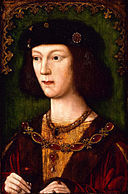Michael J. Roueche's Blog, page 6
July 12, 2013
Henry VIII: It Brought Down the House
Titled Henry VIII, Shakespeare’s play focuses more on those around the king including Anne Boleyn (Bollen), Katherine of Aragon and Cardinal Wolsey.
When I began reading Shakespeare for his 450th birthday, I expected lots of exceptional poetry, vivid imagery, timeless character traits, universal conflicts and entertaining plays able to hold the attention of “common” English men and women in the Bard’s day. I didn’t expect pedestrian propaganda. I’d seen a little royal pandering in Richard III, but Henry VIII seemed to seethe with it.
The play tells the story of Henry VIII‘s transition from first wife—Katherine of Aragon—to second wife—Anne Boleyn, the birth of Anne’s child Elizabeth, and Cardinal Thomas Wolsey‘s fall from power (and change in attitude). It seems to carefully tread the razor edge balance of loyalty to Henry (lightly criticized), respect for Katherine (virtuous to the end) and adoration for Boleyn’s daughter (Shakespeare uses Bullen as Anne’s surname).
Most scholars believe the play was written around 1613, making it one of his last plays (if not his last) and one probably written in collaboration with his successor John Fletcher. It is the only Shakespeare historical play that has no battle, and, I would argue, little drama. With no battle scene, it’s ironic that it’s the play that officially brought down the house as it was during battle-less Henry VIII that a cannon misfired igniting the theater’s thatching and burning down the Original Globe Theatre. Players and audience escaped safely both the burning theater and the weak play. I suppose, in retrospect, it might have been better (i.e., safer) had they just included a battle scene or two.

Katharine of Aragon was caught in Henry VIII’s desire for a male heir to cement the dynasty’s future.
I didn’t like this play much. In fact, I’d say it was my least favorite Shakespeare play so far in my quest to read all of his plays by his 450th birthday. Henry VIII skirts huge issues (royal succession and the departure of England from the Catholic Church), but it never feels big and quickly drowns in a pool of suffocating, over-the-top praise of Elizabeth. Elizabeth was already dead by the time the play was written and performed, so I suspect it wasn’t written to increase the playwright’s influence with the queen. Was it to win influence with James I? Was it true appreciation and praise for the Virgin queen? Or was it an endorsement of royalty in general. I can’t tell.
Examples? How about:
Let me speak, sir, for heaven now bids me; and the words I utter let none think flattery, for they’ll find ‘em truth. This royal infant [Elizabeth]…though in her cradle, yet now promises upon this land a thousand thousand blessings, which time shall bring to ripeness: she shall be…a pattern to all princes living with her, and all that shall succeed…truth shall nurse her, holy and heavenly thoughts still counsel her: She shall be lov’d and fear’d…
Etc., etc., etc. I’m just glad it wasn’t “flattery.” It almost leaves me wondering if the play was written during Elizabeth’s reign for her enjoyment, forgotten and republished after her death. (I’m allowed one conspiracy theory per year.)
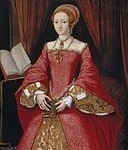
Shakespeare’s Henry VIII praised Elizabeth I effusively.
Some have suggested Shakespeare plays supported the official government line. Gary B. Goldstein, editor of the Elizabethan Review and author of an 2004 article in the Oxfordian* entitled “Did Queen Elizabeth Use the Theater for Social and Political Propaganda?” cites several authorities who suggest this possibility:
[David] Bevington [author of Tudor Drama and Politics] succinctly describes the general themes and aims of Elizabethan playwrights during the Shakespearean era: ‘. . . discussions of royal succession, obedience to authority, the efficacy of public justice, and the dangers of religious civil war were central to most plays one could see, public or private. War plays whetted popular appetites for a hysterical hatred of foreigners and stay-at-home politicians, as in post-Armada jingoistic drama.’
Another modern historian, Lily Campbell, [in Shakespeare's Histories: Mirrors of Elizabethan Policy] is emphatic about the systematic political uses to which the history plays of Shakespeare, in particular, were designed: ‘Each of the Shakespeare histories serves a special purpose in elucidating a political problem of Elizabeth’s day and in bringing to bear upon this problem the accepted political philosophy of the Tudors.’
*(Note: “The Oxfordian” focuses on honoring the person responsible for the works we attribute to William Shakespeare–and it claims it wasn’t William Shakespeare.)
I don’t know the motives behind the play, but I do know I’m awarding Henry VIII one Bard (only because that’s the lowest rating I can give it). This is the way Shakespeare’s career and his histories of English royalty end, “not with a bang, but a whimper”: 
Quotes I liked (for various reasons):
Abergavenny: I can see his pride peep through each part of him
Abergavenny: A proper title of peace; and purchased at a superfluous rate!
Norfolk: To climb steep hills requires slow pace at first
Norfolk: Heat not a furnace for your foe so hot that it do singe yourself: we may outrun by violent swiftness, that which we run at, and lose by over-running.
Buckingham: His mind and place infecting one another
Wolsey: If we shall stand still, in fear our motion will be mock’d or carp’d at, we should take root here where we sit, or sit state-statutes only.
Buckingham: I as free forgive you as I would be forgiven
Buckingham: This from a dying man receive as certain:—Where you are liberal of your loves and counsels, be sure you be not loose; for those you make friends and give your hearts to, when they once perceive the least rub in your fortunes, fall away like water from ye, never found again but where they mean to sink ye.
Bollen: By my troth and maidenhead, I would not be queen. …No, not for all the riches under heaven. …I swear again I would not be queen for all the world.
Queen Katherine: They should be good men; their affairs as righteous: but all hoods make not monks
Queen Katherine: Truth loves open dealing.
Queen Katherine: My lord, I dare not make myself to give up willingly that noble title your master wed me to: nothing but death shall e’er divorce my dignities.
Queen Katherine: Ye have angels’ faces, but heaven knows your hearts.
Wolsey: Now I feel of what coarse metal ye are moulded,—envy: How eagerly ye follow my disgraces, as if it fed ye! And how sleek and wanton ye appear in everything may bring my ruin! Follow your envious courses, men of malice; you have Christian warrant for them, and, no doubt, in time will find their fit rewards.
Wolsey: If I lov’d many words, lord, I should tell you you have as little honesty as honour
Wolsey: How much, methinks, I could despise this man, but that I am bound in charity against it!
Chamberlain: Press not a falling man too far! ’tis virtue: His faults lie open to the laws; let them, not you, correct them.
Wolsey: This is the state of man: to-day he puts forth the tender leaves of hope; to-morrow blossoms, and bears his blushing honours thick upon him; the third day comes a frost, a killing frost, and,—when he thinks, good easy man, full surely his greatness is a-ripening,—nips his root, and then he falls, as I do.
Wolsey: Vain pomp and glory of this world, I hate ye: I feel my heart new opened. O, how wretched is that poor man that hangs on prince’s favours!
Wolsey: I know myself now; and I feel within me a peace above all earthly dignities, a still and quiet conscience.
Wolsey: A load would sink a navy,—too much honour: O, ’tis a burden, Cromwell, ’tis a burden too heavy for a man that hopes for heaven!
Wolsey: I am able now, methinks,—out of a fortitude of soul I feel,—to endure more miseries and greater far than my weak-hearted enemies dare offer.
Wolsey: Fling away ambition: by that sin fell the angels; how can man, then, the image of his Maker, hope to win by it? Love thyself last: cherish those hearts that hate thee; corruption wins not more than honesty. Still in they right hand carry gentle peace, to silence envious tongues. Be just, and fear not: let all the ends thou aim’st at be thy country’s, thy God’s, and truth’s
Wolsey: My robe, and my integrity to heaven, is all I dare now call mine own.
Wolsey: Had I but serv’d my God with half the zeal I serv’d my king, he would not in mine age have left me naked to mine enemies.
Griffith: Men’s evil manners live in brass; their virtues we write in water.
Griffith: His overthrow heap’d happiness upon him; for then, and not till then, he felt himself, and found the blessedness of being little: and, to add greater honours to his age than man could give him, he died fearing God.
Cranmer: Men that make envy and crooked malice nourishment dare bite the best.
Cranmer: Love and meekness, lord, become a churchman better than ambition: Win straying souls with modesty again, cast none away.
Next Up? We’re leaving England for Greece: Troilus and Cressida
The post Henry VIII: It Brought Down the House appeared first on Michael J. Roueche.
June 18, 2013
Juneteenth: An Unlikely Choice to Mark Freedom
June 19? Juneteenth?
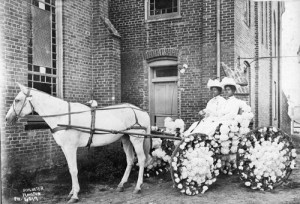
Martha Yates Jones (left) and Pinky Yates wait in a decorated carriage for the 1908 Juneteenth parade in Houston. (Image in public domain, having been taken over 100 years ago, courtesy of Houston Public Library.)
What date would you choose to celebrate freedom, specifically freedom from slavery?
Henry Louis Gates, Jr., in TheRoot.com recently noted possible candidates. In his words:
* Sept. 22: the day Lincoln issued his preliminary Emancipation Proclamation Order in 1862
* Jan. 1: the day [the final Emancipation Proclamation] took effect in 1863
* Jan. 31: the date the 13th Amendment passed Congress in 1865, officially abolishing the institution of slavery
* Dec. 6 [1865]: the day the 13th Amendment was ratified that year
* April 3 [1865]: the day Richmond, Va., fell
* April 9 [1865]: the day Lee surrendered to Ulysses Grant at Appomattox, Va.
* April 16: the day slavery was abolished in the nation’s capital in 1862
* July 4 [1776]: America’s first Independence Day, some “four score and seven years” before President Lincoln issued the Emancipation Proclamation
It’s remarkable that with such eminent dates available June 19 became the date and Juneteenth the event that perhaps best commemorates the end of slavery in the US. Why that date? Perhaps because actual freedom is more important than promised or proclaimed freedom.
Following the fall of the Confederacy, not everyone immediately told their slaves they were legally free. In fact some slaves were not freed (in such places as Kentucky) until the 13th amendment was signed.
But in Texas, covered by the Emancipation Proclamation, the reality of freedom arrived in the person of General Gordon Granger, newly appointed commander of the Department of Texas, tasked with bringing the state back into the Union. On June 19, shortly after arriving in Galveston, Granger publicly posted and read General Order #3 which began:
“The people of Texas are informed that in accordance with a Proclamation from the Executive of the United States, all slaves are free. This involves an absolute equality of rights and rights of property between former masters and slaves, and the connection heretofore existing between them becomes that between employer and free laborer.”
This emancipation came late but became real to slaves in Texas that late Spring day. From that small event sprang a celebration today–Juneteenth, a merging of June and 19th–recognized by bill or resolution in 42 states, including significantly all the states where slavery was legal when the Civil War began, including Alabama, Arkansas, Delaware, Florida, Georgia, Kentucky, Louisiana, Mississippi, Missouri, North Carolina, Oklahoma, South Carolina, Tennessee, Virginia, West Virginia and Texas.
According to Ultimate History Project, “The following year, 1866, many formerly enslaved citizens of Galveston and the rest of Texas decided to commemorate the day they first learned of their freedom. By 1867, the Freedman’s Bureau directed some Juneteenth festivities.”
Juneteenth grew from there in fits and starts until it got a more modern boost: Juneteenth.com reports it came “in 1968…through Poor Peoples March to Washington D.C.. Rev. Ralph Abernathy’s call for people of all races, creeds, economic levels and professions to come to Washington to show support for the poor. Many of these attendees returned home and initiated Juneteenth celebrations in areas previously absent of such activity.”
Whether our ancestors were held in bondage in the US or not, it’s worth a few thoughtful moments this Juneteenth to remember that freedom came, at the end of bitter fraternal struggle, to a few (and symbolically all Americans) on June 19, 1865 in Galveston. No one was free from slavery or guaranteed perpetual liberty until we all were free.
Enjoy your Juneteenth and your freedoms!
The post Juneteenth: An Unlikely Choice to Mark Freedom appeared first on Michael J. Roueche.
June 11, 2013
Richard III: Back to the Car Park
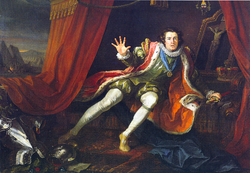
Richard III is haunted by his murdered victims, each taking a turn to curse him and pray for Richmond, the future Tudor King Henry VII, before the battle of Bosworth Field, the last time an English King was killed in battle.
I admit I liked The Tragedy of Richard III because Richard, Duke of Gloster, soon in the play to be King Richard III, was so bad. Regardless of who he was up against, you could root for his opponents and enemies—they were always at least a lesser of evils.
His ambition, his Machiavellian maneuverings, his feigned and sometimes believed familial loyalty and love, his phony self-deprecation at his own physical disabilities and supposed personality “shortcomings,” his “courtship” and marriage to and then murder of the widow of a man he earlier had murdered present a man who is beyond redemption. Yes, in the end, there are faint traces of regret (“My conscience hath a thousand several tongues, and every tongue brings in a several tale, and every tale condemns me for a villain”), but I’m inclined to think his sorrow only applies to getting caught, not remorse for what he did. He reveals no sign of a fundamental change of heart, but remains true to his awfulness. He declares in the end, “I have set my life upon a cast, and I will stand the hazard of the die….” He chooses a villain’s role to the end.
Certainly his last cry shows no regret, just continued demands for personal success: “A horse! A horse! My kingdom for a horse!” A changed soul would have uttered something like “Oh, regret! What have I done! If only the kingdom had been vouched safe with Henry VI who I murdered in the Tower or with my dear brother Clarence who I had murdered in the Tower or with my lovely nephew who I had murdered in the Tower.”
Even Richard III’s mother witnesses against his character: “Thou cam’st on earth to make the earth my hell. A grievous burden was thy birth to me; tetchy and wayward was thy infancy; thy school-days frightful, desperate, wild, and furious; thy prime of manhood daring, bold, and venturous; thy age confirm’d, proud, subtle, sly, and bloody, more mild, but yet more harmful, kind in hatred: What comfortable hour canst thou name that ever grac’d me in thy company?” (Not what you want your mother to say about you, even while you’re a teenager.)
This is a play of curses. The controlling Queen Margaret, widow to murdered Henry VI, early on curses just about everyone for what they did to her murdered husband and son. Richard’s mother, after telling Richard how horrible he is and being tutored by Queen Margaret in the art of cursing, curses him with death in the coming battle or she “with grief and extreme age shall perish, and never look upon thy face again.” And if those curses can’t erase hope from Richard’s heart, a handful of his victims come back to haunt his last night with confidence-weakening curses. The curses work as he dies in battle (the historical Richard was the last English monarch to die in battle).
Richard III is the perfect fruit and culmination of the War of the Roses and the murders and constant conspiracies between the Lancaster and the York branches of the Plantagenet family: All for control of the disputed crown. Richard’s “deformed” body is a reflection of his deformed character. Any loyalty and restraint of past generations is absent in Richard. He’s not driven by family claim, but only by his own lusts. He plots and kills Yorks and Lancasters indiscriminately because they are not Richard. He is his crazed ambition for the throne. And this monster, a byproduct of years of conflict, causes the implosion of any royal prerogatives of either family, leaving the way clear for the the Tudors to claim the crown.
The Tudors, of course, were important to Shakespeare as it’s final reigning monarch was Elizabeth I, the Bard’s queen. Shakespeare includes praise for the family, I’m sure just to please Elizabeth I, when the ghosts of Richard’s murdered nephews pray for Richmond, who becomes the first reigning Tudor as Henry VII and Elizabeth’s grandfather. The night before Richard’s last battle, they pray for his enemy and successor, “Sleep, Richmond, sleep in peace, and wake in joy; good angels guard thee from the boar’s annoy! Live, and beget a happy race of kings!”
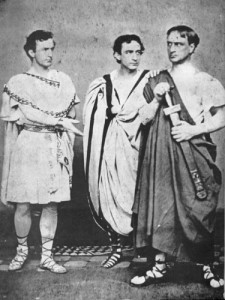
John Wilkes Booth (left) appeared with his two brothers in an 1865 production of Julius Caesar. The Booth family home was named, ironically in view of his later role as Richard III, Tudor Hall.
Over the pond, less happy associations tie Richard III to the American Civil War. John Wilkes Booth made his stage debut at age 17 in a Baltimore production of Richard III and took on the title role in early April 1863 at Washington’s Grover’s Theater (now the National Theater). According to Ernest B. Furgurson’s Freedom Rising, “The papers reviewed Booth’s performance with near ecstasy. The dashing actor’s ‘youth, originality, and superior genius have not only made him popular but established him in the hearts of Washington people as a great favorite’….” Two years later, almost to the day, whether inspired by Shakespeare’s murderous, conspiring Richard or his conflicted assassin Brutus from Julius Caesar, Booth killed Abraham Lincoln and fell permanently from his exalted station of “great favorite.”
I had an interesting experience in reading the play. From the first line of the play, I heard Richard’s voice in the tones of British actor Ron Cook. I don’t usually hear character voices in any particular voice and couldn’t figure out why Cook’s voice volunteered uninvited for the role. Out of curiosity, I looked Cook up and learned that he played Richard III in the 1983 BBC version of the play. I must have seen it sometime in the past and subconsciously decided his voice pitch-perfect for Richard III.
Was Richard III as evil as Shakespeare creates him? Of course not, and the king has received lots of good and counterbalancing press in the last year with the discovery of his body under a parking lot and the plan to rebury him more appropriately. Nonetheless, in honor of the Richard III that Shakespeare created and as a present to the Bard for his 450th birthday, I say send the king back to the parking lot! Rebury him there in March 2014.
Words that come to mind after reading The Tragedy of Richard III: the destructive cost of unbridled ambition and conflict.
I’m awarding four bards to Richard III. It’s fun reading.
Quotes I liked (for various reasons):
Richard: Now is the winter of our discontent made glorious summer by this sun of York
Richard: Since I cannot prove a lover, to entertain these fair well-spoken days,—I am determined to prove a villain.
Richard (on the chance of being king): I had rather be a pedler: Far be it from my heart, the thought thereof!
Queen Margaret: They that stand high have many blasts to shake them; and if they fall they dash themselves to pieces.
Buckingham: Curses never pass the lips of those that breathe them in the air.
Queen Margaret: Remember this day, when he shall split thy very heart with sorrow, and say, poor Margaret was a prophetess!
Richard: I cannot blame her: By God’s holy mother she hath had too much wrong; and I repent my part thereof that I have done to her. Queen Elizabeth: I never did her any, to my knowledge. Richard: Yet you have all the vantage of her wrong.
1 Murderer: What art thou afraid? 2 Murderer: Not to kill him, having a warrant for it; but to be damned for killing him, from the which no warrant can defend me.
2 Murderer: Some certain dregs of conscience are yet within me.
2 Murderer (Speaking of conscience): I’ll not meddle with it,—it makes a man a coward; a man cannot steal, but it accuseth him; a man cannot swear, but it checks him; a man cannot lie with his neighbor’s wife, but it detects him: ’tis a blushing shame-faced spirit that mutinies in a man’s bosom, it fills one of obstacles”
2 Murderer: A bloody deed, and desperately despatch’d! How fain, like Pilate, would I wash my hands of this most grievous guilty murder done!
Catesby: (I’m quoting it totally out of context): It is a reeling world indeed, my lord; and I believe will never stand upright..
Catesby: ‘Tis a vile thing to die, my gracious lord, when men are unprepar’d, and look not for it.
Hastings: O momentary grace of mortal men, which we more hunt for than the grace of God!
Richard: Know’st thou not any whom corrupting gold would tempt into a close exploit of death?
Richard: Fearful commenting is leaden servitor to dull delay
Duchess of York (Richard’s mother): Dead life, blind sight, poor mortal-living ghost, woe’s scene, world’s shame, grave’s due by brief abstract and record of tedious days, rest they unrest on England’s lawful earth.
Queen Margaret (to Duchess of York): From forth the kennel of thy womb hath crept a hell-hound that doth hunt us all to death
Queen Margaret: Forbear to sleep the night, and fast the day; compare dead happiness with living woe; think that thy babes were fairer than they were, and he that slew them fouler than he is: Bettering thy loss makes the bad-causer worse; revolving this will teach thee how to curse.
Duchess of York: Patiently hear my impatience.
King Richard III: Harp not on that string, madam; that is past.
King Richard III: Plead what I will be, not what I have been; not my deserts, but what I will deserve
Buckingham: Remember Margaret was a prophetess.—Come sirs, convey me to the block of shame; wrong hath but wrong, and blame the due of blame.
Stanley: The silent hours steal on, and flaky darkness breaks within the east.
Stanley: That which I would I cannot
Ghost of Buckingham: In terror of thy guiltiness!
Richard III: I shall despair. There is no creature loves me; and if I die no soul shall pity me: Nay wherefore should they,—since that I myself find in myself no pity to myself?
Richard III: The selfsame heaven that frowns on me looks sadly upon him.
Richard III: Let not our babbling dreams affright our souls; conscience is but a word that cowards use, devis’d at first to keep the strong in awe: Our strong arms be our conscience, swords our law. March on, join bravely, let us to’t pell-mell; if not to heaven, then hand to hand to hell.
Richmond: We will unite the white rose and the red:—Smile heaven upon this fair conjunction, that long hath frown’d upon their enmity! What traitor hears me, and says not Amen? England hath long been mad, and scarr’d herself; the brother blindly shed the brother’s blood, the father rashly slaughter’d his own son, the son, compell’d, been butcher to the sire; all this divided York and Lancaster, divided in their dire division,—O, now let Richmond and Elizabeth, the true succeeders of each royal house, by God’s fair ordinance conjoin together! And let their heirs,—God, if thy will be so,—enrich the time to come with smooth’d-fac’d peace (Elizabeth I must have loved this part.)
Next Up: Henry VIII
The post Richard III: Back to the Car Park appeared first on Michael J. Roueche.
June 3, 2013
A River Divides Cover Selected
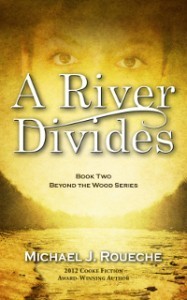 We’re excited to “unveil” the cover for the upcoming Civil War novel A River Divides, sequel to award-winning romance and action Beyond the Wood. (The cover has actually been on the website for a week, but we never called your attention to it. So we’re rectifying that deficiency.)
We’re excited to “unveil” the cover for the upcoming Civil War novel A River Divides, sequel to award-winning romance and action Beyond the Wood. (The cover has actually been on the website for a week, but we never called your attention to it. So we’re rectifying that deficiency.)
We want to thank Nick Zelinger at NZ Ggraphics for the design. As with Beyond the Wood, we greatly appreciate the young woman who modeled for the cover. Both cover models have helped us tell the story and are great young women.
A River Divides, Book Two, Beyond the Wood Series (Coming Shortly)
A River Divides picks up where Beyond the Wood ends. The widow faces new challenges that grow rapidly from the circumstances of Beyond the Wood‘s last scene. The story takes place during a slow period in the war, and I wanted to ironically subtitle it (but they wouldn’t let me) “Quiet Interlude,” because while the war machine slows for a few months, the swirl of conspiracy, treachery and mystery accelerates. Some of our favorite characters get caught in the whirlwind.
Part of the plot moves to the “united we stand, divided we fall” state–Kentucky, a border state hanging tenuously to the Union and the last state to outlaw slavery; a commonwealth where slaves, freed slaves, abolitionists and white men and women who upheld slavery mingled in foreboding uncertainty.
“More of a page turner” than Beyond the Wood is what readers of early drafts have said of A River Divides.
Oh, and did I mention there’s more romance, hopefully of the kind Small Press Bookwatch used to describe Beyond the Wood: “a unique brand of romance.”
It will be out shortly, and we hope you like it.
Watch for us to post the first chapter of A River Divides in the coming weeks.
The post A River Divides Cover Selected appeared first on Michael J. Roueche.
May 29, 2013
King Henry VI, Part Three: It had to Come to This
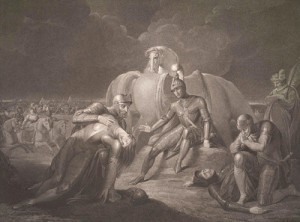
King Henry VI, Part Three is a bloodbath for commoners and nobility.
I’ve finished the King Henry VI trilogy and just reviewed my notes on King Henry VI, Part Three. I was surprised at how few I’d made, which probably means the play didn’t impress me much.
I suppose I had to read it (besides reading it to finish all of Shakespeare by his 450th birthday) to find out how many terrible things can happen to bad guys. “What of the heroes…the good guys,” you ask? What heroes? What good guys? There weren’t any among the nobility. You were expecting perhaps The Good, the Bad, and the Ugly? (Which I’ve never seen, by the way.) This ain’t it. This is a collection of the ugly (Gloster and future Richard III) and the bad (nearly everyone, including Gloster). A “clueless” is thrown in for the pleasure of all the malicious ones.
I presumed when I started reading the play the king, clearly out of his league (the clueless), would die. He did, after losing, then regaining through no interest or effort of his own, the crown. But I was fascinated that he gave away his son’s birthright so quickly, long before his death. The philosopher king didn’t seem to muster energy enough to do anything—good, bad or otherwise. Henry employed himself only in making nice sounding phrases.
The Second Part of Henry VI forebode continued bloodletting, and Part Three delivered it in rushing torrents of “noble” English blood as conspiracies rose and fell and their participants shifted allegiance between contenders for the throne. In the end, just about everyone dies.
Various Shakespeare kings envy the sleep of the common man, but this king is jealous of their simple life routines. He craves the commoner’s life he defines as:
So many hours must I tend my flock; So many hours must I take my rest; So many hours must I contemplate; So many hours must I sport myself.
All the while, the world is in chaos because he refuses to lead.
This a play of revenge and the heart break of innocents. The sons of nobility are continually promising to avenge the death of their fathers—only to be slaughtered in that effort. A commoner son kills his own father in a battle without knowing him; a commoner father kills his own son in a battle without knowing him. When the mighty are at their blood sport, the common man suffers, or as the king puts it, “Whilst lions war, and battle for their dens, poor harmless lambs abide their enmity.”
I’m glad I read Henry VI, Part Three so I could see what happens to everyone and just to get to know the despicable new Gloster (future Richard III), but it wasn’t my favorite, so I’m listing it as a one Bard show:
Henry VI, Part Three quotes I liked for various reason:
King Henry: Gives not the hawthorn bush a sweeter shade to shepherds, looking on their silly sheep, than doth a rich embroider’d canopy to kings that fear their subjects’ treachery”
King Henry: Let me embrace these sour adversities: for wise men say it is the wisest course.
King Henry: My crown is called content.
King Henry: Now join your hands, and with your hands your hearts, that no dissension hinder government.
King Edward: When we grow stronger, then we’ll make our claim: Till then,’tis wisdom to conceal our meaning.
Warwick: What is pomp, rule, reign, but earth and dust! And, live we how we can, yet die we must.
Next Up: Richard III (I can hardly wait to find out how he got under that parking lot.)
The post King Henry VI, Part Three: It had to Come to This appeared first on Michael J. Roueche.
May 24, 2013
Memorial Day: Established to Remember the Civil War Dead
[image error]We’re marking Memorial Day (or should I call it Decoration Day?) weekend with a special sale on the Kindle version of “Beyond the Wood.” If you’ve read it, please let your friends know about the sale. If you haven’t read it, I hope you’ll consider it this weekend.
The Kindle version is on sale for $2.99 (usually $7.99), and as I write this post, Amazon has the paperback at a nearly $3 discount.
The book is featured this weekend at both ereadernews and goodkindles.
“Beyond the Wood” is a fun, educational read, but it’s also a reminder of the cost many have paid to make and keep us free.
Interestingly, Memorial Day was originally established as Decoration Day after the Civil War to remember all the soldiers (Union and Confederate) who had died during the conflict. Later it was extended to all who died in military service.
Mixing commerce and such somber remembrance is, for me, always sensitive, so I can’t post this without thanking all who have served our nation and especially those who gave “the last full measure of devotion.” Lincoln, of course, at Gettysburg, when that battlefield lay quiet, captured it for all Memorial days to come:
But, in a larger sense, we can not dedicate, we can not consecrate, we can not hallow this ground. The brave men, living and dead, who struggled here, have consecrated it, far above our poor power to add or detract. The world will little note, nor long remember what we say here, but it can never forget what they did here. It is for us the living, rather, to be dedicated here to the unfinished work which they who fought here have thus far so nobly advanced. It is rather for us to be here dedicated to the great task remaining before us—that from these honored dead we take increased devotion to that cause for which they gave the last full measure of devotion—that we here highly resolve that these dead shall not have died in vain—that this nation, under God, shall have a new birth of freedom—and that government of the people, by the people, for the people, shall not perish from the earth.
The post Memorial Day: Established to Remember the Civil War Dead appeared first on Michael J. Roueche.
May 20, 2013
Fox Squirrels on the Deck: One-Eyed Jack is Back
 On the north side of our house, we have a walkway which doubles as a fox squirrel highway. (It’s heavily traveled, probably because a neighbor feeds peanuts to the squirrels, which they bury in everyone’s yards).
On the north side of our house, we have a walkway which doubles as a fox squirrel highway. (It’s heavily traveled, probably because a neighbor feeds peanuts to the squirrels, which they bury in everyone’s yards).
We have a favorite squirrel, Jack, who we hadn’t seen in a couple of years. He’s the only one we’ve named because he’s the only one we recognize. The rest all look pretty much the same. Jack’s easily distinguished because one of his eyes never developed.
We thought he had disappeared, figuring with only one eye, he hadn’t escaped predators. But he’s alive and apparently prospering. Perhaps he dropped by a couple of weeks ago just to let us know he was well and for one last lick of Winter snow (which we captured on video).

Click picture to watch Jack come down for a drink.
Fast Fox Squirrel Facts:
1) They are native to the eastern and central US (including the high plains in Colorado), northern Mexico and Canada. (We never saw them in Northern Virginia as gray squirrels dominate there.)
2) The ones in Colorado have red-tinted fur, so I would have guessed they were red squirrels. But the American red squirrel is a smaller, more territorial, much shorter-lived specie and looks almost like a chipmunk. Coloring on fox squirrels depends on where they live: gray coloring with yellow undersides in their northern range; a distinctive white stripe on its black head in the south; and the red look to the Rockies.
3) They live up to 18 years in captivity and the wild (so we may have Jack with us for a long time), although most die young.
4) They are relatively late risers, waking and breakfasting after other squirrels have settled down for the day. They’re also more active throughout the day than other species.
5) Timber removal in some areas, while harming gray-squirrel habitat, has expanded fox squirrel range because “somewhere between solid virgin forests and total timber destruction” fox squirrels flourish.
6) It is the largest U.S. tree squirrel, measuring up to 27 inches in length (including tail) and weighing up to 2.25 pounds.
7) Babies are born helpless, blind and without fur.
8) Males and females look the same (at least to us).
9)They help disperse trees by burying seeds for later use in the winter. But their memories and powerful sense of smell aren’t perfect, so they forget a few. And a significant number those few become trees. (We have peanuts plants continually popping up in our yard and gardens.)
10) They often communicate with a clucking sound.
Sources: All sites accessed May 9, 2013
University of Michigan Museum of Zoology http://animaldiversity.ummz.umich.edu/accounts/Sciurus_niger/
Indiana Department of Natural Resources http://www.in.gov/dnr/fishwild/3373.htm
Tree Squirrel Fact Sheet from University of Georgia, Internet Center for Wildlife Damage Management http://icwdm.org/handbook/rodents/ro_b171.pdf
Ohio Department of Natural Resources https://www.dnr.state.oh.us/Home/species_a_to_z/SpeciesGuideIndex/foxsquirrel/tabid/6633/Default.aspx
Nature Works http://www.nhptv.org/natureworks/easternfoxsquirrel.htm
Macaulay Library, Cornell Lab of Ornithology http://macaulaylibrary.org/audio/127055/sciurus-niger-eastern-fox-squirrel-united-states-illinois-r-alan-zelley
The post Fox Squirrels on the Deck: One-Eyed Jack is Back appeared first on Michael J. Roueche.
May 16, 2013
King Henry VI, Second Part: Some Questions are Answered
The struggles between the “usurping” red-rose-themed Lancaster and the white-rose-aligned York branches of the Plantagenet family continue in Shakespeare’s King Henry VI, Second Part. I found Part One was more comedy than history. Part Two is simple tragedy.
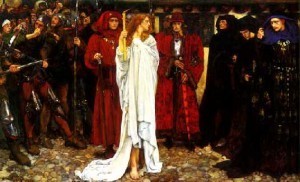
Eleanor, the Duchess of Gloster, is paraded through the streets for disloyalty to the crown.
Like Part One there is a dearth of heroes, with the Duke of Gloster being the only one (even his wife plots against the king). But he is dealt with quickly and surely, leaving buffoons and conspirators to live the rest of the story.
When we last left our characters (at the end of King Henry VI, First Part), the fair young princess Margaret was being whisked from her father’s small-time (but because of a marriage contract with the young king of England, greatly enhanced) kingdom, and evil Lord Suffolk, who had certain affection for the young queen, was conniving to control the boy king and dominate the ruler’s new bride.
I hope you lost no sleep worrying about the young innocent queen. Because she is far from helpless and not very innocent. She is a lion, apologies to the specie, in all the worst senses. She plots with Suffolk against the king’s most important ally and eventually has him murdered, and, in the end, when Suffolk is banished, she clearly shows an unseemly attachment to the disgraced and soon-to-be-murdered Suffolk.
The king, however, gets my sympathy. One more example why royalty is a bad idea: He was, in Shakespeare’s world, forced to fill a role in which he did not fit. Henry VI is not created to reign as a monarch but to live simply as a reclusive, kind, thoughtful philosopher. In Part One of the thrice-divided life of King Henry VI, his youthful age promotes a wrestling match all around him, as the nobles (I use that word loosely) choke and scratch and poke and punch one another trying to bring down the competition for power. Now in the Second Part of the king’s life, it is his personality that allows the struggles to continue. He wants everyone to be friends. “Why can’t we just get along?” seems his life philosophy, but no one else even wants to acknowledge the question.
At the end of the play, a bloody rebellion of commoners led by Jack Cade has collapsed and a rebellion of York-allied nobles has just begun. We’ll have to wait to see how it ends, but I don’t hold much hope for the king’s cause—if he ever claims one—or for his life. Being a weak king seems to assure a brief term limit.
This play of complicated alliances, whispered conspiracies and bloody rebellions leaves me with the thought: Everyone wants to be king, and that doesn’t create peace, stable government, or hold on to power overseas.
Too much conspiracy and murder, without any redeeming message, for my taste, but it did keep my attention. So balancing those elements, I’m giving it three Bards:
Quotes I liked (for various reasons):
York: Pirates may make cheap pennyworths of their pillage, and purchase friends, and give to courtezans, still reveling like lords till all be gone; while as the silly owner of the goods weeps over them, and wrings his hapless hands, and shakes his head, and trembling stands aloof, while all is shar’d, and all is borne away, ready to starve, and dare not touch his own….
Gloster: Banish the canker of ambitious thoughts!
King Henry: To see how God in all his creatures works! Yea, man and birds are fain [archaic for: prefer] of climbing high.
Gloster: ‘Tis but a base ignoble mind that mounts no higher than a bird can soar.
King Henry: [Heaven]: The treasury of everlasting joy!
Gloster: The envious people gazing on thy face, with envious looks laughing at thy shame, that erst did follow they proud chariot wheels, when thou didst ride in triumph through he streets.
Duchess of Gloster: See how the giddy multitude do point and nod their heads, and throw their eyes on thee.
Gloster: Thy greatest help is quiet.
Gloster: The world may laugh again.
Duchess of Gloster: Death, at whose name I oft have been afear’d because I wish’d this world’s eternity.
Queen: Smooth runs the water where the brook is deep.
Suffolk: For things are often spoke and seldom meant.
King: What stronger breastplate than a heart untainted! Thrice is he arm’d that hath his quarrel just, and he but naked, though lock’d up in steel, whose conscience with injustice is corrupted.
Suffolk: Small things make base men proud. (I would add, we’re all by nature base men.)
Cade (during his rebellion and like a good politician): I thank you, good people: there shall be no money; all shall eat and drink on my score; and I will apparel them all in one livery, that they may agree like brothers, and worship me their lord. Dick: The first thing we do, let’s kill all the lawyers. Cade: Nay, that I mean to do. Is not this a lamentable thing, that of the skin of an innocent lamb should be made parchment? That parchment, being scribbled o’er, should undo man? Some say the bee stings: but I say, ’tis the bee’s wax; for I did but seal once to a thing, and I was never mine own man since.
Cade: He can speak French; and therefore his is a traitor.
King: O graceless men! They know not what they do.
Cade: Exhort all the world to be cowards; for I, that never feared any, am vanquished by famine, not by valor.
York: Let them obey that know not how to rule.
York: Thus war hath given thee peace, for thou art still.
Next Up: King Henry VI, Third Part.
The post King Henry VI, Second Part: Some Questions are Answered appeared first on Michael J. Roueche.
May 14, 2013
Baby Rabbits and an Unexpected Nest
We don’t have enough coyotes, foxes and owls in Colorado.
How I do know?
Because we have too many rabbits! And the rabbits eat most of the plants we try to grow. Up till last week, we thought some plants protected because we raised them off the ground in old wine barrels, and we’d never seen a rabbit in one of the barrels (lots of squirrels, but no rabbits).
But now I’m convinced nothing is safe from these rapidly reproducing, hungry cottontail bunnies.
Click on the barrel to see video of the bunnies.
We were getting the barrels ready for growing herbs again this year, adding peat and the usual materials, when the old dirt began to move. From a hole, underneath old, dead basil plants (not the ones in the picture), came three small bunnies, one far more energetic than his siblings.
Were they were old enough to survive on their own?
According to ehow.com’s “How to Save a Baby Bunny”
Once a rabbit is the size of your fist, has its eyes open and ears that stick straight up, it’s old enough to survive on its own. Release it into a wooded area with plenty of undergrowth. You should look for a white blaze on its forehead; this is a good indicator that it is old enough to survive without your help.
There was no way to put the nest back together. We understood bunnies are one of the most difficult young wild animals to successfully “rescue.” The nest location was awful (What was the mother thinking?): Once the bunnies successfully jumped out of the barrel as one did, they’d never be able to get back in. So because they met most criteria for survival, including size, open eyes and no white blaze on face, we relocated them to the edge of a nearby open field (with lots of underbrush) and wished them well.
Nothing personal, but we still would like to see more owls, foxes and coyotes.
The post Baby Rabbits and an Unexpected Nest appeared first on Michael J. Roueche.
April 30, 2013
He’s Too Young in King Henry VI, Part One
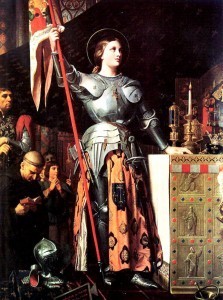
Joan of Arc at Charles VII coronation
Henry VI, Part One seems to me to be a treatise on power vacuums.
Henry V dies unexpectedly, leaving a young son to reign as Henry VI. The young Henry, not in control of his kingdom, is surrounded by adults who want power, manipulate him for that power, and whose squabbles for power and adult pride and tantrums result in the death of the play’s only heroes (Talbot, father and son) and territorial losses in France.
Even discounting that it was written in English, it would be hard to miss the fact that the plot and characters evidence this play was to be performed for English audiences. There’s nothing about it the French would have liked it. Even at their conniving heights, the English are portrayed as strong, while the French are dull and hopeless.
The French as portrayed are insulted (“Done like a Frenchman,—turn, and turn again!”—and that’s from a French mouth) and shown as incompetent. I suspect that “proof of their weakness” for contemporary audiences would have been their dependence on schemes of women to save them. First it’s a woman who on her own plots to kidnap the heroic and greatly feared Talbot. The plot is the plan of a simpleton, easily foiled by wise and brave Talbot. Talbot is later defeated, but only because of dissension within the English.
Then comes French Joan of Arc. Shakespeare presents the heroine through distinctly English eyes. She seems OK at first—a virtuous young woman. Of course, the English are busy calling her nasty names—“that witch, that damned sorceress, hath wrought this hellish mischief unawares” and “foul fiend of France, and hag of all despite, encompass’d with thy lustful paramours!” The names foreshadow her “guilt.”
Without warning, Joan stoops to entertaining fiends of hell, and apparently, this isn’t her first interview with them. Then, when she’s captured, she denies her own father, suddenly claiming royal birth. Her father is appalled by her rejection and encourages the English, “O, burn her, burn her! Hanging is too good.”
But her evil is yet not completely revealed. When faced with burning, she tries to save her own life by admitting that she’s (or claims to be) pregnant by the King of Naples. The English are indignant at the “liberal and free” “strumpet.” She is just what they knew she was—a “foul fiend” surrounded by “paramours.”
Joan was Catholic, so perhaps Shakespeare writing with an Anglican audience in mind was thumbing his nose at the French and the Catholic Church. I suspect audiences of the day must have loved it.
Another work of fiction about Joan was Mark Twain’s account of her life. In its concluding lines, he includes, “I have finished my story of Joan of Arc, that wonderful child, that sublime personality, that spirit which in one regard has had no peer and will have none – this: its purity from all alloy of self-seeking, self-interest, personal ambition. In it no trace of these motives can be found, search as you may, and this cannot be said of any other person whose name appears in profane history.”
You wonder if Twain’s Joan had an evil sister also named Joan who was chronicled by Shakespeare. Or perhaps, both accounts are fictitious.
I worry that Shakespeare didn’t know he was writing a history and instead thought it was to be comedy. For after all these battles and lives lost, we’re heading for a happy ending. Even the Dauphin becomes reasonable and agrees to be an under-king to Henry VI.
Happy ending? Shakespeare wrote a cliff-hanger. The king has fallen in love with Margaret, the daughter of the King of Naples. (Although I can’t remember that he’s met her.) But the king is already inconveniently promised to another. Don’t worry, reassures peer and royal adviser Suffolk. You’re the king. Ignore your royal promise! Marry the girl of your dreams! After all, King, romantic love is what makes the world glorious. It’s looking like a “happily ever after.”
But who is this wise counselor Suffolk? He’s nothing but a married man who has a passion for young Margaret. His arguments sway the king. Young Henry will marry Margaret.
Then, when you think some semblance of love has prevailed, the play concludes with Suffolk’s words: “Margaret shall now be queen, and rule the king; but I will rule both her, the king, and realm.”
What will happen to fair, innocent Margaret? What will become of the young king now in harm’s path? And will conspiring Suffolk have his way? We’ll have to wait to find out.
The phrase that came to mind as I read the play was internal dissension weakens nations.
If King Henry VI, First Part were a comedy, I’d rate it higher. But since it’s history—and highly biased for the audience—I’ll award it a stingy two Bards:
Quotations I liked for various reasons:
Joan: Glory is like a circle in the water, which never ceaseth to enlarge itself till by broad spreading it disperse to naught.
Talbot: Kings and mightiest potentates must die, for that’s the end of human misery.
King Henry: What madness rules in brainsick men, when for so slight and frivolous a cause such factious emulations shall arise!
Exeter: When envy breeds unkind division; there comes the ruin, there begins confusion.
Talbot: You tempt the fury of my three attendants, lean famine, quartering steel, and climbing fire.
Lucy: Let not your private discord keep away the levied succours that should lend him aid.
Lucy: The fraud of England, not the force of France, hath now entrapp’d the noble-minded Talbot: Never to England shall he bear his life; but dies betray’d to fortune by your strife.
Lucy: His fame lives in the world, his shame in you.
Joan: Of all base passions fear is most accurs’d….
York: After the slaughter of so many peers, so many captains, gentlemen, and soldiers, that in this quarrel have been overthrown, and sold their bodies for their country’s benefit, shall we at last conclude effeminate peace? Have we not lost most part of all the towns, by treason, falsehood, and by treachery, our great progenitors had conquered?
Suffolk: That he should be so abject, base, and poor, to choose [a wife] for wealth, and not for perfect love.
Suffolk: Marriage is a matter of more worth than to be dealt in by attorneyship; not whom we will, but whom his grace affects, must be companion of his nuptial bed.
Suffolk: What is wedlock forced but a hell, an age of discord and continual strife? Whereas the contrary bringeth bliss, and is a pattern of celestial peace.
Next Up: Henry VI, Second Part
The post He’s Too Young in King Henry VI, Part One appeared first on Michael J. Roueche.

